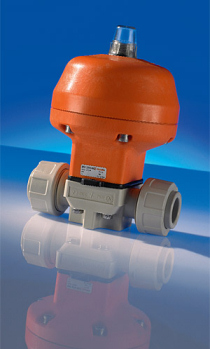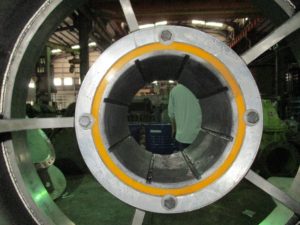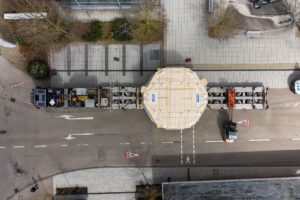„Bio water” for Biomass Power Station
Lockerbie is a Scottish town with a history and a future. It is also where E.ON operates the largest biomass power station in Great Britain. The heart of the 44 megawatt power station
is a desalination plant for process water, which was designed by SIWAtec Wassertechnik GmbH & Co. KG, and operates by reverse osmosis and downstream electrode ionization (EDI) completely without the use of chemicals.

Diaphragm Valve MV 310
This engineering company from Langgöns/Hesse in Germany specializes in the development of water treatment plants and primarily designs desalination plants for power stations. Their engineering expertise is internationally sought after. SIWAtec exclusively fits thermoplastic valves from ASV Stübbe in its plants to guarantee its own high quality standards.
Chemical-free process
Until now, water desalination in power stations was mostly achieved with the use of ion exchangers. In this process, the dissolved salts in the water are bound to ion exchange resins. The exchange capacity of the resins is limited, so chemicals are added to reactivate the resin. “The use of chemicals is expensive and takes up space, and handling them involves risks to people and the environment,” says Frank Schlichtherle, Managing Director of SIWAtec Wassertechnik GmbH & Co. KG. Within five months, Schlichtherle and his seven-man team built a SIWApure plant for chemicalfree water desalination and water degassing with a capacity of two times 8 m³ per hour. For safety reasons, only ASV valves (diaphragm valves and ball valves) and flowmeters were used.
The plant has two identical lines. The capacity of one line is sufficient for desalinating the process water. The second line is switched on automatically if the first line fails in order to guarantee 100% process reliability. “We want to use our technical knowhow to realize the best solution for our customers, and the quality of the plant components is crucial. ASV components are absolutely reliable. This allows me to guarantee complete reliability of the water treatment,” says Schlichtherle.
Optimum water treatment
The pre-desalination in the SIWApure plant is achieved by reverse osmosis. This involves pumping the process water at high pressure through a semipermeable membrane. The fine pore membrane retains 98% of the salt. The remaining 2% of the salt is removed by a downstream electrode ionization module (EDI). The EDI with integrated ion exchangers is used instead of a mixed bed filter and combines the advantages of the ion exchange and electrolysis. The dissolved salts are bound to ion exchange resins and transported in the direction of the electrical poles by the applied voltage.
The resins function as an exchanger material. They release cations such as calcium, magnesium and sodium and anions such as chloride, sulphates or bicarbonates from the water, replacing them with H+ and OH ions. The water is practically salt-free, has the quality of pure water and can therefore be fed back into the process. The conductivity of the water is < 0.060 μS/cm. The resin is continuously and automatically regenerated during the process due to the constant electrical voltage. Therefore, chemical regeneration and thus neutralization is not required.
Innovative vacuum degassing
An activated charcoal filter and a water softening plant are connected upstream of the SIWApure plant. Following reverse osmosis and before removal of the residual salt content in the EDI, the water flows through a membrane degassing system where the CO2 is removed from the water by vacuum degassing. This uses an innovative technique in which the hydrophobic hollow fibre membrane module permits continual and fast gas exchange. This does without the need for caustic soda for reducing the oxygen content and improves the effectiveness of the EDI.
It is a highly complex process, which takes place in several steps and places high demands on the installed pipeline components. Only ASV Stübbe diaphragm valves of the type MV 310 are used. “We chose these valves because of their integrated emergency control and stroke limit. This ensures maximum safety within the system. Moreover, the valves can be set in situ without the need for additional equipment. As well as the quality aspect, they offer a clear cost advantage for our customers,” says Schlichtherle. The MV 310 features excellent control characteristics and a visual position indicator, and can be automated. It is available in the sizes DN 15 to DN 150 and in the following materials: PVC-U, PVC-C, PP and PVDF. The MV 310 is resistant to aggressive and corrosive substances.
Renewable raw materials will be burnt at a temperature of 700 °C in the biomass power station in Lockerbie. The plant supplies up to 70,000 households with CO2-neutral electricity. Full desalination of the water is absolutely necessary because even the finest trace elements would be deposited on the turbines during evaporation of the water. This would soon lead to corrosion and scaling and cause serious malfunctions.
ASV Stübbe has been a reliable partner for SIWAtec for more than 20 years as a manufacturer of components for pipework construction with valves, pumps and measuring and control systems.
The family-owned company from Hesse strives to achieve the economically and ecologically optimum solution during planning and construction. “We therefore need reliable partners as suppliers, such as ASV Stübbe,” says Managing Director Frank Schlichtherle.
Source: STÜBBE GmbH & Co. KG



